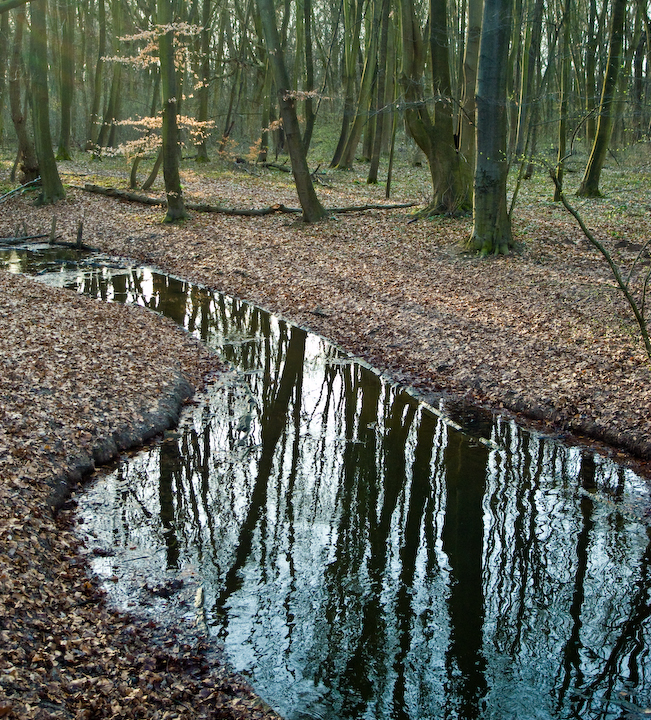
It’s a word for thinking, “reflection”. That’s odd, because thinking is more than echoing the world back to itself.
Reflection in a German pond.
I’ve been thinking a lot recently, reflections of recent events much in my mind and the strata of communication, the distance between discourse and polemic and marketing. I do discourse all the time and polemic when I have to.
If you don’t experience an event yourself—directly or via a recording—you have no recourse but the reflections off others’ minds. Which is all our species had until very recently.
At the end of the day it’s unsatisfying, I want to experience everything with my own eyes and ears and mind but nobody can. So it’s reflections, and oftentimes reflections of reflections of reflections. They become stories and each story’s teller, even one not trying to twist it, adds some and loses some.
At the end of the day it’s a miracle that “journalism” produces anything remotely useful. At the end of the day, the day’s story in the words of a participant has fewer reflections and (let’s be bold) more truth. In the separate words of several participants, there’s a hope of seeing the reflections’ imperfections.
Reflection in a Vancouver car.
I dunno. I’m a Chomskyan, think that Homo sapiens is the language-using member of the animal kingdom. What could be more important than getting the news out? What could be more interesting than a change in the structure of storytelling?
Comment feed for ongoing:
From: MikeP (Mar 06 2008, at 05:31)
Maybe it's reflecting your own thoughts back at you, so you can see the problems more clearly?
Even if you're personally at an event, your own perceptions will suffer from the same imperfections as everybody else's, and you may be deluded into thinking that if you disagree with somebody else, you must be correct, since you were there.
Personal attendance is not a panacea for imperfections in the reporting of an event; it just ensures that your voice will be added to the collective experience. Maybe that's enough.
[link]
From: len (Mar 06 2008, at 06:17)
What is more interesting? Grooming the monkey to my left and being groomed in return, then sharing a banana.
Proximity is everything to truth, Tim. You won't find it in the camera lens. You can see it in your daughter's eyes.
[link]
From: Jacek (Mar 06 2008, at 07:56)
Yes, it would be cheap and practical to record everything at the BRM and make it available to the public. What is the process of amending the ISO processes to encourage or even mandate this?
And more importantly, would such openness cause companies and maybe even governments to seek and establish other, more closed, standardization venues?
[link]
From: John Cowan (Mar 06 2008, at 08:01)
Tim: I think the "reflection" in question is that of the speech stream: we reflect what we are saying back into ourselves, so that we can hear it. Thinking is talking to yourself.
Len: Sometimes truth (who, poor girl, was nobody's daughter; she took off her clothes and jumped into the water, as the poet says) is found by rearing back, putting on the glasses, and taking the long view. At least if you're myopic like me.
[link]
From: Ciaran (Mar 06 2008, at 13:57)
Oddly, your reflections in a German pond and a car lead to reflections on the French language, illustrated with pictures of reflections in a German car... http://blog.ciarang.com/posts/reflections-in-a-bonnet/
[link]
From: Rob (Mar 06 2008, at 13:29)
"Reflecting" like "Research" are hangovers from the late Middle Ages/Early Renaissance, when it was believed that everything was already known or had been discovered, and it was simply a matter of discovering it again, of reflecting back what was already there. Because everything possible already was, you simply had to find it and show it. For us now, a very alien world view, to say the least.
[link]